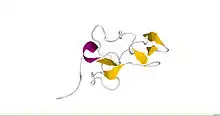Prokineticin
Prokineticin is a secreted protein that potently contracts gastrointestinal smooth muscle.[2]
| Prokineticin 1 | |||||||
|---|---|---|---|---|---|---|---|
 Prokineticin 1[1] | |||||||
| Identifiers | |||||||
| Symbol | PROK1 | ||||||
| NCBI gene | 84432 | ||||||
| HGNC | 18454 | ||||||
| OMIM | 606233 | ||||||
| RefSeq | NM_032414 | ||||||
| UniProt | P58294 | ||||||
| Other data | |||||||
| Locus | Chr. 1 p21 | ||||||
| |||||||
| prokineticin 2 | |||||||
|---|---|---|---|---|---|---|---|
| Identifiers | |||||||
| Symbol | PROK2 | ||||||
| NCBI gene | 60675 | ||||||
| HGNC | 18455 | ||||||
| OMIM | 607002 | ||||||
| RefSeq | NM_021935 | ||||||
| UniProt | Q9HC23 | ||||||
| Other data | |||||||
| Locus | Chr. 3 p21.1 | ||||||
| |||||||
Recently, prokineticins have been recognized in humans and other vertebrates.[3] They are thought to be involved in several important physiological processes like neurogenesis, tissue development, angiogenesis, and nociception.[3] Other important physiological roles the Bv8/Prokineticins (PKs) are involved in may include cancer, reproduction, and regulating physiological functions that influence circadian rhythms like hormone secretion, ingestive behaviors, and the sleep/wake cycle.[4]
Mutations in the PROK2 (also known as KAL4) gene have been implicated in hypogonadotropic hypogonadism and gynecomastia.[5]
See also
References
- "RCSB Protein Data Bank - Structure Summary for 2KRA - Solution structure of Bv8".
- Li M, Bullock CM, Knauer DJ, Ehlert FJ, Zhou QY (2001). "Identification of two prokineticin cDNAs: recombinant proteins potently contract gastrointestinal smooth muscle". Mol. Pharmacol. 59 (4): 692–8. doi:10.1124/mol.59.4.692. PMID 11259612. S2CID 1597745.
- Morales RA, Daly NL, Vetter I, et al. (September 2010). "Chemical synthesis and structure of the prokineticin Bv8". ChemBioChem. 11 (13): 1882–8. doi:10.1002/cbic.201000330. PMID 20677202. S2CID 32535956.
- Negri L, Lattanzi R, Giannini E, Melchiorri P (September 2007). "Bv8/Prokineticin proteins and their receptors". Life Sci. 81 (14): 1103–16. doi:10.1016/j.lfs.2007.08.011. PMID 17881008.
- Narula, Harmeet S.; Carlson, Harold E. (2014). "Gynaecomastia—pathophysiology, diagnosis and treatment". Nature Reviews Endocrinology. 10 (11): 684–698. doi:10.1038/nrendo.2014.139. ISSN 1759-5029. PMID 25112235. S2CID 40159424.
External links
- PROK1+protein,+human at the US National Library of Medicine Medical Subject Headings (MeSH)
- PROK2+protein,+human at the US National Library of Medicine Medical Subject Headings (MeSH)
This article is issued from Wikipedia. The text is licensed under Creative Commons - Attribution - Sharealike. Additional terms may apply for the media files.